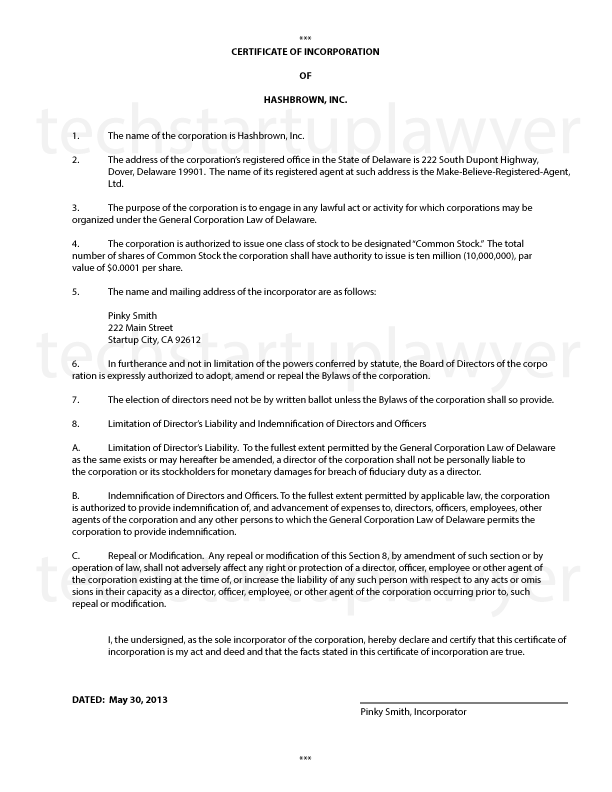The first step to incorporate a technology startup is to prepare and file the Certificate of Incorporation with the Secretary of State. Think of it like the birth certificate of the company and the beginning of the life of the startup. Don’t be confused with synonymous terminology — in Delaware this document is called the Certificate of Incorporation but in California it is called the Articles of Incorporation. It’s the same thing.
Different states have varying requirements in the Certificate of Incorporation, and certain statutory provisions can be varied only if specifically stated in the Certificate of Incorporation, but it will usually include at least the following:
1. Name of the corporation. In Delaware, the name must include one of the following words: association, company, corporation, club, foundation, fund, incorporated, institute, society, union, syndicate or limited (or the abbreviations).
SPEEDBUMP: Don’t forget to think about trademark infringement when picking a name. It is important to understand that name availability doesn’t necessarily mean that the trademark rights are not owned by someone else. When picking a name for my startups, I always suggest conducting a quick trademark search on the USPTO website (or go hire an intellectual property attorney to do it for you) and confirm availability of the domain name.
2. Purposes and powers of corporation. Pretty simple. . . don’t do anything illegal. The Certificate of Incorporation will usually state that the startup is “engaging in any lawful activity for which corporations can be organized in this state.” Startups should stay with this standard language and keep the purposes of the corporation as broad as possible. Most states do not require a specific purpose. The only time an issue has come up with this provision in the Certificate of Incorporation is with startups that are extremely passionate about “triple bottom line” (i.e. people, planet and profit) and want to insert some language in the purposes provision. These companies should still try and keep the language as broad as possible to avoid inadvertently violating the Certificate of Incorporation.
3. Authorized number & classes of shares. The Certificate should also include the total number of shares of Common Stock that may be issued by the company. If the startup brings on investors later in the game, the investors will usually be issued Preferred Stock and the Certificate of Incorporation will be amended accordingly. However, to start out, most startups simply authorize a certain number of shares of Common Stock.
4. Par value. This might be one of the most misunderstood concepts (next to vesting for options vs. vesting for founders’ shares) because it is a fairly archaic term. For most states, the concept of par value is generally irrelevant. In fact, most states don’t require a par value anymore. Some founders incorrectly assume that the par value is equivalent to the fair market value of the shares.
SPEEDBUMP: For startups incorporated in Delaware it is very important to have a par value associated with your shares. The corporate tax implications could be pretty bad if you do not have a stated par value. The reason is that Delaware has an alternative method of computing tax that will significantly lower the tax bill by using a calculation based on the stated par value of the shares.
5. Name and address of resident agent. Most startups use a third party agent for service of process to receive any legal notices.
6. Indemnification. The Certificate of Incorporation will also include a provision indemnifying directors, employees, officers and other agents. An indemnification is essentially an insurance policy whereby the startup agrees to reimburse the directors, employees and officers for any loss they incur associated with their employment.
Finally, one last principle to understand is that any amendment to the Certificate of Incorporation requires board AND stockholder approval. This might seem obvious but it is very important to keep in mind because it means changes to any rights, preferences or privileges that are included in the Certificate of Incorporation will require stockholder and board approval. This is the reason why some investors want certain protective provisions to be included in the Certificate of Incorporation instead of some other contractual agreement between the parties. It can provide the investor a higher level of comfort and certainty.
Timeframe. At the time of writing this post, Delaware has been turning around filings in 2 to 3 business days, but California is taking 6 to 8 weeks. However, California does have rush fees for a few hundred dollars.
To give you an idea of what it looks like, here’s a sample form of a Delaware Certificate of Incorporation for a fictional startup called Hashbrown, Inc.:
CLICK HERE to download a PDF version of the sample Certificate of Incorporation







